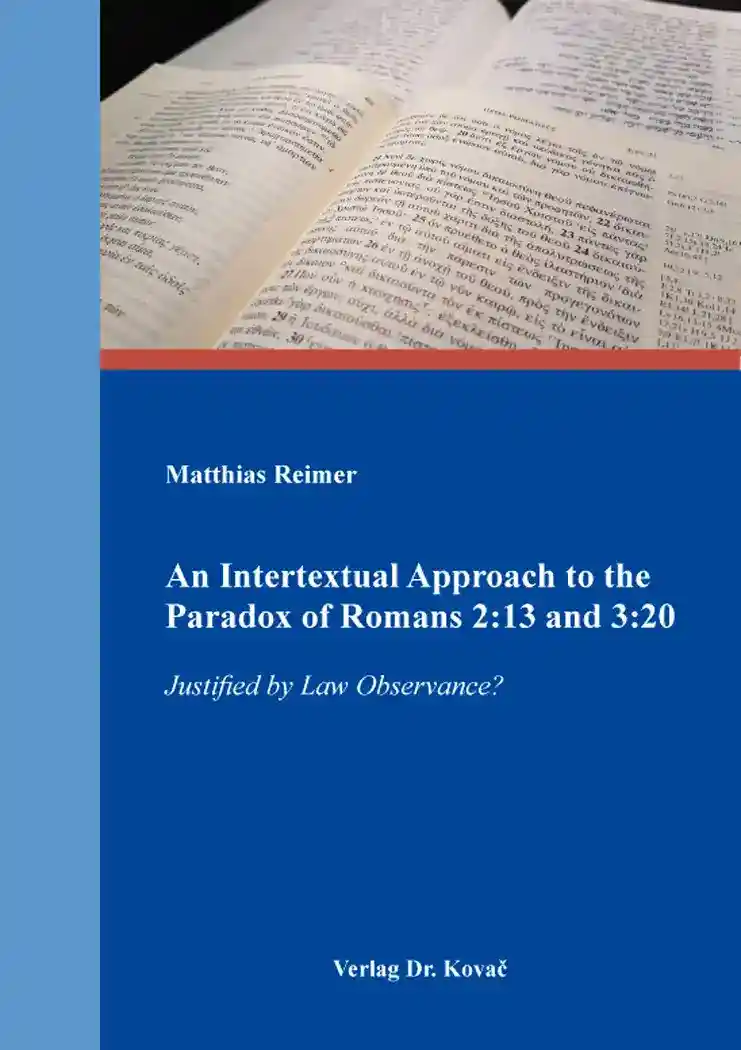Matthias ReimerAn Intertextual Approach to the Paradox of Romans 2:13 and 3:20
Justified by Law Observance?
– in englischer Sprache –
THEOS – Studienreihe Theologische Forschungsergebnisse, Band 160
Hamburg 2022, 272 Seiten
ISBN 978-3-339-12904-8 (Print)
ISBN 978-3-339-12905-5 (eBook)
Zum Inhalt
Romans 2:13 has long been a stumbling block for protestants. That “the doers of the law will be justified,” seemingly does not fit the doctrine of justification by faith alone. On the other hand, this Pauline statement appears to support the Roman Catholic dogma which claims good works deserve justification at the final judgment. In their embarrassment, protestants read Rom 2:13 as a hypothesis: If there were any human beings able to keep the law perfectly, they would be justified by God because of their law obedience. But, since “no flesh will be justified before him on account of works of the law” (Rom 3:20), Rom 2:13 can never be actualized. This book scrutinizes these and other interpretations of Rom 2:13 and 3:20 and reveals their weaknesses. Against a hypothetical reading of 2:13, for example, Reimer observes how 2:26–29 mentions actual law-obedience that leads to divine recognition of one’s membership in God’s people at the final assize. With regard to 3:20, he points to the fact that Rom 1:18–3:20 never envisions a person who is striving to achieve perfect law fulfillment but humankind (gentiles and Jews) in constant rebellion against God. The impossibility of perfect law observance is not the point of 3:20.
Beyond its critique of the attempts at solving the tension between Rom 2:13 and 3:20, this work offers an explanation that does justice to both of these verses and takes into account Paul’s use of the Jewish Holy Scriptures. This approach is promising because these Scriptures are the foundation on which Paul builds his argument. A study of his reception of them makes his argumentation more comprehensible. Reimer interprets Paul’s statements in Rom 2 in the light of the motive of judgment according to works common in the Holy Scriptures. For a clearer understanding of Rom 3:20, he exegetes each of the passages Paul cites or alludes to in Rom 3:9–20. The result may be surprising: Romans 2:13 and 3:20 constitute valid and operative principles in Paul’s eyes. Yet, forgiven believers are excluded from consideration in 3:20. Anticipating strong protestant reactions, Reimer offers some clarifications in his conclusion. Finally, he tackles the view that Paul does not care for the original meaning of the text he cites. Reimer draws out how Paul’s use of the Jewish Holy Scriptures considers the context of each of his references and how an analysis of the original contexts actually leads to a better understanding of Paul.
Schlagworte
Altes TestamentGesetzIntertextualitätNeues TestamentOT in NT / AT im NTParadoxPaulusPsalmenRechtfertigungReligionswissenschaftRömerbriefTheologieWerkeIhr Werk im Verlag Dr. Kovač
Möchten Sie Ihre wissenschaftliche Arbeit publizieren? Erfahren Sie mehr über unsere günstigen Konditionen und unseren Service für Autorinnen und Autoren.
